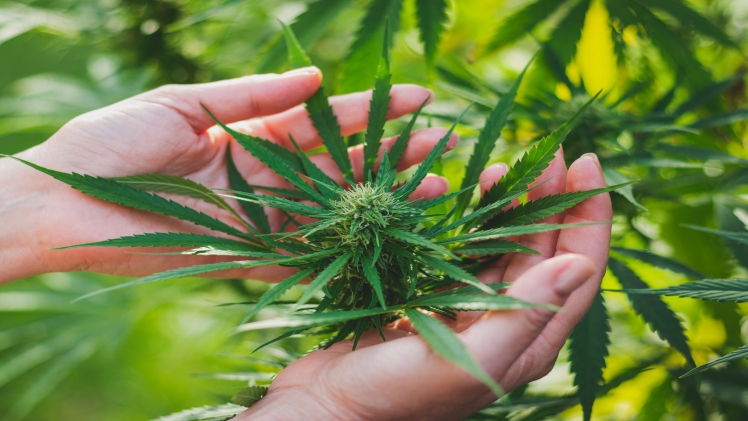Before the COVID-19 pandemic was declared in 2020, America was already burdened with an epidemic, which still rages on. Opioid abuse was declared a public health emergency in 2017 by the United States Department of Health and Human Services. In 2019, 70,630 people died of a drug overdose in Amerika and another 48,006 died from overdosing on synthetic opioids other than methadone.Shockingly, many opioid overdose deaths involve prescribed opioids.
The pandemic has worsened the problem. Every state has reported a spike or increase inoverdose deaths during the COVID pandemic.
Opioid addiction has proven to be an intractable condition for which the nation desperately needs a solution. In this article, we discuss the results from onerandomized clinical trial that shows promise for the use of CBD oil Canada for the treatment of opioid addiction. In addition, we share what has happened to the opioid crisis in states where medical marijuana has been legalized.
The role of triggers in addiction relapse
It is notoriously difficult to recover from an addiction. Relapse is only too common. One of the classical reasons for relapse is so-called environmental triggers.
In the case of opioid abuse, apart from the trigger of people and places connected to drug abuse, seeing the paraphernalia such as a syringe, rubber tie, or packets of pills related to the habit can trigger a craving andcause a person to relapse.
If it were possible for people to take a substance that causes them to be neutral to environmental triggers, fewer people might relapse.
A recent study looked at the possibility of using CBD oil to help reduce the cravings and anxiety people experience when exposed to a trigger in order to reduce the danger of relapse and overdose.
The study
Most of the 42 participants had been using heroin for more than ten years and had not used the drug for less than one month. The researchers used the only FDA-approved CBD product, namely, Epidiolex, which has been approved for seizures in the experiment.
The researchers randomly assigned the volunteers to receive 400 mg of CBD, 800 mg of CBD, or a placebo medication once daily for three days. The researchers measured to results:
- Theeffect of the medication on opioid craving and anxiety
- Positiveand negative emotions
- Physical reactions like skin temperature, blood pressure, heart rate, respiratory rate, and cortisol levels to determine stress response
Exposure to triggers and measures were then performed and three points afterwards: immediately after, 24 hours after, and seven days after receiving the CBD.
The triggers consisted of a video that showed intravenous or intranasal drug use and exposure to heroin-related paraphernalia.
Study findings
The volunteers that received the CBD medication reported less craving after being exposed to drug cues than individuals receiving placebo. After a week, this was still true for those who had received the high dose. The physical measures of stress response were also lower for those receiving CBD compared to placebo. They also reported less anxiety than the control group.
What can we learn from this study?
The results of this study may point to the use of CBD to minimize the danger of common drug use triggers causing people who struggle with addiction to experience repeated relapse during their efforts to recover from addiction.
A study published in May 2018 in JAMA Internal Medicine reported that prescriptions for opioids decreased in states that have medical marijuana laws. Researchers looked at Medicare data from 2010 to 2015 and found that states with active dispensaries saw 3.742 million fewer daily doses of opioids filled by pharmacies.
The relationship between opioid use andlegal medical cannabis
Many states have legalized the use of the marijuana plant for medical purposes. Medical cannabis uses the whole marijuana plant with all its cannabinoids to treat diseases or conditions. The major compounds in medical cannabis are THC, CBD, and CBN.Medical cannabis products are available inmany different combinations and concentrations of THC and CBD.
While many states have legalized medical cannabis, Federal law supersedes state law, so people can get arrested for producing, selling or using medical marijuana.
That aside, states that have legalized medical cannabis have seen a drop in opioid prescriptions.In fact, several studies have shown that cannabis can help combat the opioid crisis.
A 2019 study that appeared in Preventative Medicine, researchers from the University of Texas reported on prescription opioid use among people with private insurance and compared their findings in states with and without medical marijuana. They reported lower opioid use in states with medical cannabis laws.
An earlier study found thatimplementing a fully legal cannabis system in 2015 was associated witha 32 percent decrease in opioid prescriptions, a 30 percent decrease in the total number of doses and a 31 percent decrease in spending on Schedule III opioids.
A multiple institution study in 2018 used a novel approach. The researchers looked at data about counties within the same state where cannabis dispensaries had been opened. They had access to the data about when a dispensary opened for business. From data between 2009 and 2015, researchers concluded that counties with medical cannabis dispensaries had significantly lower of opioid and heroin overdose rates than counties that didn’t have dispensaries.
Interesting findings of the 2017 National Survey on Drug Use and Health
The comprehensive surveythat involved 67,500 interviews with people 12 years and older found that opioid abuse decreased dropped from 2016 to 2017, while cannabis use increased. In 2016, 11.8 million people were abusing opioids, and in 2017 the number dropped to 11.4 million. At the same time, more people started using cannabis, 26 million in 2017 compared to 24 million in 2016.
Final thoughts
Up to now, no strategy has worked in the fight against the opioid crisis in the US. With more than 300,000 opioid-related deaths in the last decade, the nation desperately needs a solution. The cannabis plant, with its many active phytochemicals, may be worth investigating further in this pursuit.

